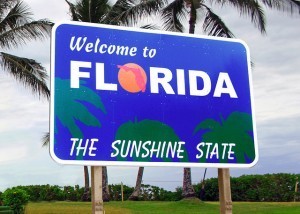Relocating To Florida: Part One – Weather and Finances
 We’re gearing up for another frigid Winter here in Minnesota. My nose would be longer than Pinocchio’s if I didn’t admit there were some days I thought to myself, “Man, it would be nice to just move and live at Disney World!”
We’re gearing up for another frigid Winter here in Minnesota. My nose would be longer than Pinocchio’s if I didn’t admit there were some days I thought to myself, “Man, it would be nice to just move and live at Disney World!”
Now, the odds of me living at Disney are very slim, but hypothetically, if I DID decide to move to the sunshine state, how would I go about this?
I did the research, and enlisted the help of two amazing women, who have gone through the relocation process, in an effort to make this series as informative as possible. I played the part of investigative reporter to interview Julia Mascardo (who relocated from Maryland) and Natalie Reinert (moved in December from New York City). Let’s see what these ladies had to say about relocating to Florida!
Weather
Vacationing in the Florida weather is one thing, but living in it year round is another. Read on as I discuss Florida’s weather conditions with Julia and Natalie.
Should the extreme Florida weather (hurricanes, high summer temps, rain) influence your decision to relocate?
Julia: I think as long as someone has had some experience with the weather in the summer down here (on vacation or whatever), they can handle the rest of the year with ease. In the summer, weather is a toss-up in terms of temperature between here and there: it is equally as hot in the DC area as it is in Florida, just without the benefit of the 4 PM thunderstorm that blasts out the heat and humidity.
Natalie: Some people struggle with the lack of seasons. I like our seasons: we have the rainy season and the dry season. But I do find that I forget what time of year it actually is. Like, it will be March and I pause and try to remember if it’s fall or spring. But that might be a personal thing.
Julia: Basically, if you’re a normal working person, you are indoors working during the heat of the day and usually the storm showers are done before the evening commute. The weather is a great thing to gripe about, but it doesn’t affect life down here the way that snow affects life up north. As my husband likes to say, no matter how hot it gets, you don’t have to shovel or plow heat!
Natalie: A lot of people are intimidated by hurricanes. I’m really more concerned with tornadoes than hurricanes. But a hurricane can be a big financial hit even if the storm doesn’t do much damage, because you have to stock up on groceries, fill the cars with gas, etc., with just a few day’s notice. In 2004 we had several hurricanes just a few weeks apart, and it was really expensive just in terms of buying canned goods, gas, putting cash in wallets, even evacuating in one case.
We do get an extreme variety of weather here, including wildfires, and new residents should study up on Florida’s ecology and understand (and learn to protect) our unique state.
Money Matters
No matter the age, finances play a huge role in planning your future move. If you will be retiring in Florida, you will be going from a steady income to none. Do you plan on getting a part time job or using your retirement savings? If you are still in the work force, you will need time to figure out the job situation.
Below are some websites to help you compare the cost of living in Florida versus your current city or town.
What are the financial benefits and disadvantages of living in Florida?
Julia: Groceries are cheaper, not only because of price (which is only about 5-10% cheaper), but because I’m not driving an hour round trip to go to a grocery store I like. Walking the quarter of a mile to Publix works for me in terms of price and health.
Natalie: Last night I did a dance in the middle of Target because I bought a box of Special K for $2.50, and in NYC it would be $5.79. End of discussion. Since we came from NYC, some of our bills went up (electricity) and some went down (groceries, drastically), but I think we might come out ahead. Although we relied on NYC public transit, our transportation costs were still pretty high, so if we keep it to one car for as long as we can, that will pretty much even out.
Julia: Fuel is about 10-15 cents per gallon cheaper, and the distances we drive are less. Less driving means less wear and tear on the cars. We do some travel on toll roads every now and then, but the tolls are a lot less than in Maryland. We save 10-40% on “basic living” bills (utilities, Internet/phone, mortgage/rent, etc.), and we no longer pay for pest control service (included) or a home security system until we get into our new home, so those bills are gone (at around $100/month, it adds up).
Natalie: Rent is less here in Florida, for a lot more space. We’ll continue to rent in order to avoid the upkeep on a house, which can be pretty steep in a place with such violent weather extremes.
Julia: Another benefit is that there’s no state income tax in Florida. It also means I don’t have to pay someone to do my state income tax! Sales tax is 0.5% higher in our county in FL (or 1% higher the next county over), but as we don’t go shopping like we used to, it’s not a major impact.
Natalie: Florida resident discounts are also a huge perk. There are a decent number of places in Florida that offer resident discounts, especially in the tourist zones. Whether it’s a cruise or theme park tickets, you stand to save so much money just by having a Florida address.
Julia: As for disadvantages, our insurance rates went up slightly. In general, it is just a trade off here and there. The biggest expense we found, if you aren’t prepared for it, is registering your car in the state. If you have purchased a car in the past six months, you will have to pay sales tax on the full price of the car when you arrive. Even without that, registering our cars was a pretty hefty price.
Also, the process to get a car registered here is a bit quirky. First, you have to have a Florida driver’s license. Then, you need to obtain car insurance in the state of Florida. After those two tasks are completed, then you can get your plates.
If you don’t make an appointment for the driver’s license and for the registration, each visit can take around three hours if you arrive when they open. After waiting to get a driver’s license, we learned that you absolutely must make a reservation unless you have days to spend at the tax collector’s office (which is where you go for a driver’s license).
These websites are great resources to help you obtain a Florida driver’s license and vehicle registration:
Florida Highway Safety and Motor Vehicles
How long did it take you or your spouse to find a job in FL?
Julia: As a freelance editor, my job moved with me, but my husband needed a local job. Going through IT contractor firms, he was able to secure a short-term contract within six weeks. However, he had already been laying the ground work by applying for jobs six months before we moved. Having a Florida address does open doors for employment, but you still have to really know your skills and do your research to find companies that can use your talents.
Natalie: Originally my husband transferred within his company, so we haven’t run up against this particular issue.
Julia: The job bit is probably the biggest challenge for most people. It’s very difficult to get a job down here without an address in Florida, but it is very difficult for most people to get an address in Florida without a job to move down for. If you’re in a professional career, having local recruiters can be a great way to get you an in. Heck, getting a job down here could be its own small book!
Did you consider working in a theme park?
Julia: My husband joked that if he couldn’t get an IT job, he’d just sell popcorn on Main Street, U.S.A. and be quite happy. In the end, his dream job was to work in IT for Disney. After a lot of perseverance while working a short-term contract elsewhere, he got an opportunity to become an IT contractor with Disney approximately seven months after we arrived.
Natalie: Since I worked for Walt Disney World before, that was a big part of moving back to the Orlando area for me. I’m very passionate about working for the Walt Disney Company in some capacity, and so I intend to do that again. Originally, I started as a front-line Cast Member, hired during one of the annual spring job fairs, and moved into management. Now I’m still exploring roles for the best fit for my current career path.
That’s all for Part One! What financial considers do you have when considering a big move? Share them in the comments. See you next time for Part Two where we’ll discuss the housing situation and the Disney distance !
• Facebook • Twitter • Google Plus • Pinterest • Print
Relocating To Florida: Part One – Weather and Finances is a post from the TouringPlans.com Blog. Signup for a premium subscription today! Or get news via Email, Twitter, & Facebook.
Bob Sehlinger's Blog
- Bob Sehlinger's profile
- 30 followers



